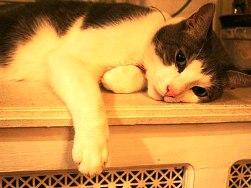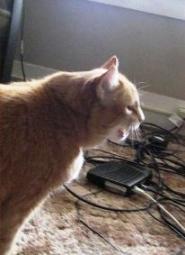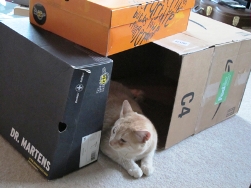Categories: Featured Articles » Sharing experience
Number of views: 21065
Comments on the article: 2
How to teach a cat not to chew on electric wires
 Everyone who has a cat knows that these animals are distinguished by both individual character and a variety of quirks and whims.
Everyone who has a cat knows that these animals are distinguished by both individual character and a variety of quirks and whims.
One of the most dangerous quirks is the desire of cats to chew, bite, catch cords and wires, especially thin wires leading to modern household appliances.
Avoiding this behavior is challenging, requiring both ingenuity and perseverance. And the question here is not so much about the safety of household appliances, but about how to avoid the terrible consequences of an electric shock of your overly playful pet.
Just as parents make a home safe for their child, cat owners should think about how to protect the house for the cat and from the cat.
Identify places in your home where there is a danger of electric shock. Each electrical appliance that is at the cat's growth level is potentially dangerous. Pay particular attention to the wires extending from home appliances, such as computers and printers, those wires that are difficult for you to reach, and it will not be difficult for a cat (for example, to use a refrigerator or a TV).
The most vulnerable spot for power cords is where they connect to a power outlet or appliance.
 Check how many appliances are plugged in and how far they are from it. Do not overload outlets with the number of connected devices. A heavy load on the power grid and loosening of the wires by the cat near the junction of the plug and socket can cause a circuit in the system, and pose a threat not only to the animal, but to the whole house. Dangling wires are a temptation for a cat to play with them.
Check how many appliances are plugged in and how far they are from it. Do not overload outlets with the number of connected devices. A heavy load on the power grid and loosening of the wires by the cat near the junction of the plug and socket can cause a circuit in the system, and pose a threat not only to the animal, but to the whole house. Dangling wires are a temptation for a cat to play with them.
Disconnect unnecessary wires and electrical appliances and hide them in a safe place not accessible to the cat.
Make a rearrangement in the house in order to hide the wires behind the furniture so that the cat could not get them. And remember that cats are able to penetrate those places that you think are narrow and he is able to move small objects.
If several wires are hanging nearby, then fasten them together so that they do not sway. Rocking attracts cats. The wires can also be attached to a table or a pedestal using clips, and this will exclude the wire from objects of interest to the cat.
Make the wires not pleasant for the cat. You can splash or wrap them with something that annoys cats. Let it be something hot, like pepper or garlic, or an unpleasant smell, like lavender oil. Some people use ointments with a specific smell, which are used by athletes to rub before training. Just remember to dry the wire before connecting it to the power supply. Do not forget to repeat the procedure periodically, as these substances tend to evaporate. Avoid using salt, cats like to lick salt.
Wrap the wire with something tight to prevent the cat from chewing it.
Wrap the wire with tin foil, you can buy it at a building materials store, and it easily wraps around the wire. Cats don’t like the taste of alkali, and they will stay away from everything that tastes that way.
Wrap the wire with double-sided tape. Cats do not like sticky and will avoid touching such surfaces. Only one snag: this surface will attract dust and other debris.
 Take a washcloth, pour detergent on it and draw along the entire length of the wire, and the cat will never touch it again.
Take a washcloth, pour detergent on it and draw along the entire length of the wire, and the cat will never touch it again.
And if you still caught the cat playing or biting the wire, then either shout sharply, or make a sharp movement. You can also use a water gun when the cat sneaks to an unsafe place.Just try not to get water into the appliance. You can also throw something at the cat that will not harm him if you caught him on a hot one, just don’t throw anything at the kitten — it can be dangerous for him!
Great if there is a toy - a motion detector with a sharp sound. Place her in a place dangerous for the cat’s games, and over time he will avoid it.
Find what to do with the cat. Chewing the wire may indicate that the cat is bored or he is practicing hunting skills, or he just needs to play.
Buy grass for animals. Cats need to chew grass, and if it is not there, then they can take up the wires.
 The cat should have a lot of small toys. If they are not there, then he can try to make them himself out of improvised objects. Just do not buy those toys that look like wires, so as not to provoke the animal.
The cat should have a lot of small toys. If they are not there, then he can try to make them himself out of improvised objects. Just do not buy those toys that look like wires, so as not to provoke the animal.
Take the cat out of the room where you are stroking, vacuuming, using a hair dryer, etc. The sound of the working device will scare the cat away, but he may try to play with the wire during the break of the work being performed.
Alternatively, you can throw cocktail tubes around the apartment. This is fun for the cat, and replacing the wires with a chewing-safe item.
However, regularly check the integrity of the wire winding in your apartment. Cats are smart and persistent in achieving their goals. They can damage the wire even without visible signs of damage on its surface.
Also hide cats, strings, threads and gum, as they can get into the respiratory tract or esophagus and cause, if not death, then a serious medical problem.
Maragrit Sukach
See also at bgv.electricianexp.com
:
